WIKA - Wissenschaftlicher Initiativkreis Kultur und Außenpolitik - Referenten
Panel 1: Visions and Challenges for New Cultural Relations
Panel 2: Realities of a Neo-Nationalist Development
Panel 3: Models of Future Cultural Relations
Panel 1: Visions and Challenges for New Cultural Relations
 |
A Tale of Two Europes. Non-Simultaneity in European Development Dr. Zaal Andronikashvili Zaal Andronikashvili is a research fellow at the Centre for literary and cultural research, Berlin (ZfL) and Professor at the Ilia State University, Tbilisi. He studied History and Literature in Tbilisi, Saarbrücken and Göttingen. His research topics concern theory of literature and culture with a special focus on Eastern Europe. Currently he coordinates a project at the ZfL „Batumi, Odessa, Trabzon. Cultural Semantics of the Black Sea from the perspective of the eastern port cities“. Selected publications: Landna(h)me Georgien. Studien zur kulturellen Semantik, Berlin 2018 (Co-autor with Emzar Jgerenaia und Franziska Thun-Hohenstein), Traumland Georgien. Deutungen zur Kultur und Politik (Osteuropa, 7/2018, co-edited with Manfred Sapper und Volker Weichsel), Grundordnungen. Geographie, Religion und Gesetz, Berlin 2013 (co-edited with Sigrid Weigel).Die Ordnung pluraler Kulturen. Figurationen europäischer Kulturgeschichte, vom Osten her gesehen, Berlin 2013, Co-edited with Andreas Pflitsch, Tatjana Petzer und Martin Treml. Abstract
|
Panel 2: Realities of a Neo-Nationalist Development
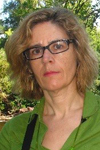 |
Has Economy Anything to Do with Neo-Nativist Identities? Prof. Dr. Antonia María Ruiz Jiménez Abstract |
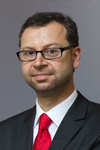 |
The Role of the Nation for Sovereignism and Retro-Modernisation in Central and Eastern Europe Dr. sc. pol. Kai-Olaf Lang Kai-Olaf Lang is a Senior Fellow at the German Institute for International and Security Affairs of the Stiftung Wissenschaft und Politik, a foreign-policy think-tank based in Berlin. He holds a diploma in public administration and a PhD in Political Sciences. Previously, he worked as a research fellow at the Federal Institute for Eastern and International Studies (Bundesinstitut für internationale und ostwissenschaftliche Studien, BIOst) in Cologne. His fields of specialisation include: countries of Central and Eastern Europe (CEE), including their transformation, domestic political developments, foreign and security policy, bilateral relations with Germany; EU enlargement and implications; security issues in CEE and European Neighbourhood Policy. He is a member of the Deutsche Gesellschaft für Osteuropakunde, of the German-Polish Kopernikus-Group, of the Council of the German-Czech Discussion Forum, of the Editorial Board of Przegląd Zachodni (Poznań), of the Advisory Board of Aspen Review Central Europe (Prague) and of the Scientific Council of Nowa Res Publica (Warsaw). Abstract In recent years, some EU member states from Central Eastern Europe have been pursuing a profound transformation of their societies, their political cultures and the understanding of democracy. At the same time, their attitude towards the EU and the external environment has been perceived as assertive and defensive. The forces behind these approaches want to fundamentally reconstruct their countries in order to (re-)gain strength and recognition. Domestically, this means a specific policy of modernisation recurring to history and traditional values. With regard to European and foreign policy, the countries in question have been looking for protection of their sovereignty. In this context, the reference to the nation, to collective identity and shared memory, is an important factor. Therefore, at least three questions have to be analysed more profoundly: What exactly is the role and relevance of the nation in processes of domestic reforms and foreign policies in Central Eastern European countries? Is there a specifically strong "return" of the nation and the national state in this part of Europe, and if yes, what are the root causes and why is it happening now? What does this all mean for their position and priorities about the future of the EU? |
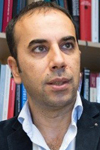
photo by Karla Fritze |
The Sources of New Authoritarian Populism: Resentment, Reactionary Opinion Formation and Neo-Nationalist Mobilization Dr. Zafer Yilmaz Zafer Yılmaz is a visiting scholar (Dr.) at the Faculty of Economics and Social Sciences, Potsdam University. He is affiliated at both the Centre for Citizenship, Social Pluralism and Religious Diversity and the Chair of Sociology at the University of Potsdam. He works currently on the rise of authoritarianism, transformation of the rule of law and citizenship in Turkey. He has recently published a book on the AKP and Turkish politics, with a title, Yeni Türkiye’nin Ruhu: Hinc, Tahakküm, Muhtaclastirma-The Spirit of New Turkey: Resentment, Domination and Destitution, İletişim Yayınları, September-2018 (In Turkish). His latest publications include “Revising the Culture of Political Protest in Turkey after the Gezi Uprising: Radical Imagination, Affirmative Resistance and the New Politics of Desire/Dignity” Mediterranean Quarterly, Special Issue: Erdogan and the Transformation of the Turkey, Vol. 29, Issue, 3, September (2018), “The AKP and the Spirit of the ‘New’ Turkey: Imagined Victim, Reactionary Mood, and Resentful Sovereign,” Turkish Studies (2017), and “‘Strengthening the Family’ Policies in Turkey: Managing the Social Question and Armoring Conservative-Neoliberal Populism,” Turkish Studies (2017). Abstract The populist, ethno-nationalist and authoritarian right-wing politics have been strengthening almost in all over the world. Even though there is proliferating literature on the rise of the radical right-wing politics in countries such as Turkey, Hungary, USA and recently in Brazil, the key questions about the success of the new authoritarian populism still need further inquiry. To answer the questions such as “where the energy of new authoritarian populism come from?” “How can we identify its popular energizing features? and “How they successfully mobilize the masses?”, this presentation will propose that we should focus on “deep-lying trends” in modern society. More specifically, to shed light on how and in what way right-wing populist leaders structures psycho-political field and appeal to political dispositions of their supporters, the presentation will aim to discuss the specific articulation between nationalist political imagination, the sphere of opinion, and the field of emotion in different country examples. To understand the contemporary congruence between demand side of the radical right politics and cultural and cognitive orientation of their supporters, I will argue that we need to focus on dominant characteristics of entire cultural climate and total structure of modern society once again, rather than solely discussing discourse and approach of the radical right politics. To fill this gap, the presentation will argue examples of Turkish, Hungarian and USA case more specifically. |
Panel 3: Models of Future Cultural Relations
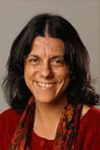 |
The Importance of Multilingual Brains for Cultural Relations Prof. Dr. Antonella Sorace Antonella Sorace is Professor of Developmental Linguistics at the University of Edinburgh. She is a world leading authority in the field of bilingual language development across the lifespan, where she brings together methods from linguistics, experimental psychology, and cognitive science. She is also committed to disseminating the findings of research on bilingualism in different sectors of society. She is the founding director of the research and public engagement centre Bilingualism Matters, which has 23 branches all over the world. Abstract |
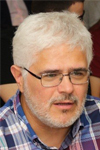 |
Intercultural Cities: New Realities, New Dimensions, New Actors Dr. Stefanos Vallianatos Stefanos Vallianatos holds a Ph.D. from Lancaster University (U.K.) in the field of International Politics with special reference to the Middle East and Eastern Mediterranean. He is the head of the Department of International Relations of the Hellenic Foundation for Culture, the coordinator of the Greek National Network of the Anna Lindh Foundation and co-founder of Fotoessa, a centre for Education, research and action. By default, he is also an active member of EUNIC, at the corporate level and at the cluster level (of Athens). He has also taught Middle East Politics at the International Centre for Hellenic and Mediterranean Studies, and frequently publishes on issues related to Middle East politics and civil society in the Mediterranean region, whereas he is also a certified trainer of the Creative Entrepreneurship Program. Abstract |
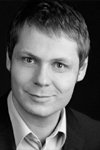 |
Cultural Relations as Conflict Prevention: Some Lessons for a Future “Post Nation State Cultural Policy” Dr. Jens Adam Jens Adam holds a position as assistant professor at the Institute for European Ethnology at Humboldt-University in Berlin. His research interests include cultural policy, humanitarian aid, political violence, cities as well as processes of Europeanization and Cosmopolitization. For his most recent book “Ordnungen des Nationalen und die geteilte Welt. Zur Praxis Auswärtiger Kulturpolitik als Konfliktprävention” (Bielefeld 2018) he conducted ethnographic fieldwork in Berlin, Ramallah, Jerusalem, Tel Aviv and Sarajevo to study practices and formats of translating the German Foreign Office’s official policy to “prevent conflicts via culture”.* His current research project is based in Lviv (Western Ukraine) and focuses on the interrelations between urban development, statehood and Europeanization. * open access via this link Abstract |
